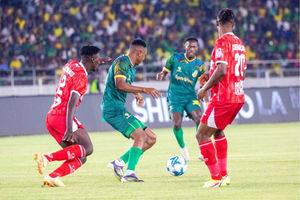Msongole on gender inclusivity and digital literacy

Ndimbumi Msongole, Marketing Manager at Digital Opportunity Trust. PHOTO | COURTESY
What you need to know:
- Ndimbumi Msongole, Marketing Manager at Digital Opportunity Trust and a corporate communications consultant, shares her thoughts on how Tanzania can promote gender inclusivity and bridge the digital literacy and skills gap. Interview by Mpoki Thomson
You have vast experience in the fields of communications, strategy, and marketing. How did you build your leadership muscles over the years?
In my field, staying up to date with trends, tools, and situations is one of the best ways to grow. I have made a point to read, learn from the best, test out new tools, and take on seemingly intimidating tasks that stretch my abilities, growing my skills and experience.
I have also been fortunate enough to have amazing women and men guide me in all the organisations I have worked with. These phenomenal leaders, Lydia Igarabuza, Eliguard Dawson, and Diana Ninsiima, positioned me in the leadership space by demanding more creativity, providing support, and giving me autonomy in my work.
As the marketing manager at Digital Opportunity Trust (DOT), how are you utilising your leadership skills to encourage gender equality?
I have made it my mission to highlight the success stories of as many young women as possible. Being in a gender-sensitive organisation, I have come to learn that, as human beings, we believe by seeing, and when we see more women in leadership positions, the old norms that held us back lose their meaning and, in time, they will fade.
In your opinion, what keeps women from climbing the corporate ladder?
There are two sides to the coin in this unfortunate situation: internal and external factors. External forces that hold women back from attaining leadership positions include conscious and unconscious biases, nurture/upbringing, and institutional mindsets.
In some places, women are not expected to hold leadership positions, and in such institutions, you will find that they do hire women, plenty of them, but they seem to be everywhere but at the top management levels. This can happen consciously or unconsciously, where you may find women are actively discouraged from holding a leadership position or where decisionmakers fail to see women holding certain positions.
On the other side of the coin are the internal forces where women hold themselves back and box themselves through their thinking. Because of social conditioning, women tend to make career decisions that make them good socially but sabotage their careers. For example, a woman may refuse to take on a leadership role that takes her to a new geographical location because she feels bad about uprooting her family.
Women also tend to box themselves into certain positions, holding back their creativity, solutions, and ideas for the fear of looking like know-it-alls or smarter than the men they work with. As women, we need to learn how to recognise when we are sabotaging ourselves.
Your role involves promoting digital skills and literacy, especially among youth. What is your comment on the digital skills gap in Tanzania?
The digital skills gap will keep on widening unless deliberate efforts are made by our government and development partners to close this gap, and soon. When Covid-19 hit, it became clear that digital literacy, access to technology, and the internet were no longer luxuries but essential parts of human life.
We are living in a digital age, where rapid technological advances demand that a person be online to access certain opportunities and services. It is therefore imperative that we upskill our youth, especially young women, and also reskill the current workforce so they too can lead sustainable lives within the fast-changing job market.
At DOT, we are closing this gap through the Daring to Shift project, an initiative that supports over 300 local youth as leaders of change who are training over 10,000 of their peers in digital skills for business and work.
How can Tanzania attain gender inclusivity in the digital space?
We can start with our education system and ensure that young women are encouraged and well-accommodated to join IT courses. I once spoke to a young woman who joined college to study computer science. She told me that while she was still excited and happy to be in such a class, she was crushed when the first lecturer who entered her class asked, “What are girls doing in this class? Anyways, I know you will never last a semester in here.”
To my relief, this young woman was speaking to me after she had graduated from that same class, but 80% of the very few young women who were with her in that class dropped out within weeks. I heard the same story coming from a different college, and it could be what many young women are facing, maybe even in secondary school.
A mindset shift is what we need, and we can start by showcasing successful young women leading in digital spaces, then mentoring and building resilience in the rising digital stars so they become the beacons for young women to follow. These actions, paired with accommodating policies that protect privacy and keep the digital space safe, can help us attain gender inclusivity.
What are the guiding principles you cannot compromise in your professional life?
Delivering quality products and services. I pour all my creativity and passion into all my projects, no matter how big or small. The aim is to always exceed expectations. The second principle is striving for efficiency. I take my time when planning and do my very best to follow through with execution. It is with this principle that I keep myself up to date with the latest tools and technologies that will help me deliver my work as planned. The third is collaboration: I work with a team I can trust, and I do my very best to be reliable to them.
You have led DOT in the execution of various national projects and campaigns, working with both private and government institutions and ministries; what is the secret to your success?
Having a network of partners, mentors, and professional acquaintances is what I can attribute to my success. I have been fortunate enough to be positioned as one of Tanzania’s digital communication authorities, where I consult organisations on leading hybrid events (on the ground and online). While there are so many other professionals doing what I do, very few have managed to fully embrace all the technological tools that can be integrated into creating immersive experiences.
How do you balance work and family?
I have learned to draw boundaries between work and my family, and I do so by planning my days effectively ensuring that my work ends at a certain time and it does not spill over to my time with family. During my work hours, I avoid senseless chatting, phone calls, and outings, and during family time, I avoid all non-emergency work conversations.
This delicate balance does not come easily, and when I have to compromise one for the other, I make a mental note to avoid such situations in the future.
What challenges do you go through at work, and how do you address them?
One of the challenges I am facing in my work is oversaturation and overcommunication. Yes, it’s actually a thing and comes as a surprise to many people. In this day and age where there is a free flow of information, it is a challenge to get a message across without sounding like a broken record or chasing away the audience you are trying to influence. As an enthusiastic learner, I keep myself up to date by reading books and attending seminars that shed light on effective communication strategies.
What is your proudest career achievement?
Managing the Tanzania Youth Digital Summit events since 2019 is one of my proudest achievements. This annual summit is a national platform to mobilise and inspire underserved and disadvantaged youth with digital literacy, 21st-century skills, and self-confidence to realise their potential in an inclusive digital economy.
With a lean team that rarely exceeds 12 people and at least 5 volunteers, TYDS started with 3 regions and now serves 11, started with 2 funding partners and now has 6, and started with 400 attendees and now attracts 3,900.





